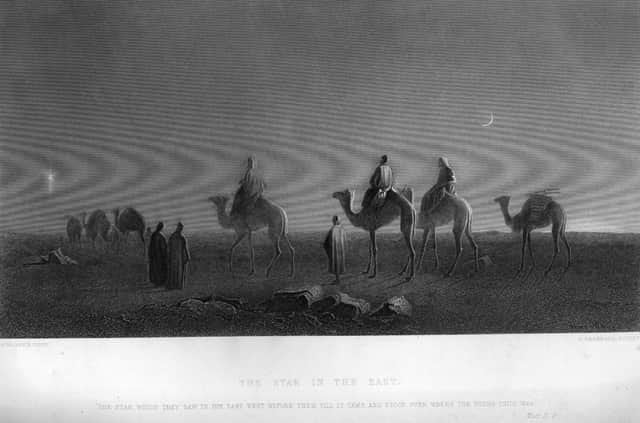Christmas Nativity: who were the three wise men, what route did they take to see Jesus and what were their gifts?


The Three Wise Men, also known as the Three Kings and the Three Magi, were distinguished men who brought gifts to the baby Jesus just after his birth. They feature regularly in Christmas celebrations and are an important part of the Christian tradition.
The Three Wise Men are mentioned in the Gospel of Matthew, which is only one of the four canonical gospels that mention the Magi. But why did they visit Jesus and what route did they take? Here is what you need to know.
Who are the Three Wise Men in the Christmas Nativity?
Advertisement
Hide AdAdvertisement
Hide AdThe Three Wise Men are known as Magi - the plural of the Latin term magus - which refers to the Persian case of Zoroastrianism. The priests of this religion paid attention to the stars and gained an international reputation for astrology.
Although the Magi are commonly referred to as "kings", there is nothing in the account from the Gospel of Matthew that implies that they were rulers of any kind. The Magi's visit is known as the Adoration of the Magi (or the Visitation of the Wise Men), and it should be noted that Jesus' birth and the Wise Men's visit were two separate events that were combined for convenience - as stated in the New Revised Standard Version of Matthew 2:1-12.
What was the journey of the Three Wise Men?
In the Bible, it states the Magi came "from the east" or more literally "from the rising [of the sun]". The Book of Matthew provides more about the region from which they came, which is the Parthian Empire in Persia which stretched from eastern Syria to the fringes of India.
However, their journey has led to a lot of speculation where Historian John of Hildesheim relates a tradition in the ancient Silk Road city of Taxila (in present-day Punjab, Pakistan).
Advertisement
Hide AdAdvertisement
Hide AdIt has also been suggested the Magi came from Rome or Central Asia. Canoness Anne Catherine Emmerich says that the Magi came from the border between Chaldea and Elam, mentioning Ur, "Mozian" (Iraq's Maysan Province, anciently known as Mesene), "Sikdor" (Shushtar, near Susa), and a "city, whose name sounded to me something like Acajaja" (Aghajari), as well as other cities farther east.
Who were the Three Wise Men and what were their gifts?
The Magi's names were not revealed in the Bible, so there has been large speculation on who the men were. In the Western Church, it's suggested the men were known as Melchior - a Persian scholar, Caspar - a king from India and Balthazar- a Babylonian scholar.
However many Syrian Christians name the Magi, Larvandad, Gushnasaph, and Hormisd and Eastern Christians call the Magi: Hor, Karsudan, and Basanater. The Armenian Catholics have: Kagpha, Badadakharida and Badadilma.
Their exact motivation to visit Jesus is unknown, other than seeing the star in the east, which they took to be the star of the King of the Jews, but the third chapter of the Syriac Infancy Gospel says that they were pursuing a prophecy from their prophet, Zoradascht (Zoroaster).
Advertisement
Hide AdAdvertisement
Hide AdThe three gifts the Magi bought are gold, frankincense and myrrh. There have been a number of theories as to why the three Magi bought those gifts to Jesus, ranging from being ordinary offerings to a King to having a deeper spiritual meaning.
Gold is a precious resource - a symbol of kingship on earth, frankincense (an incense) is a symbol of deity, and myrrh (an embalming oil) is a symbol of death. It has also been suggested that the "gifts" were medicinal rather than precious material for tribute.
Comment Guidelines
National World encourages reader discussion on our stories. User feedback, insights and back-and-forth exchanges add a rich layer of context to reporting. Please review our Community Guidelines before commenting.
